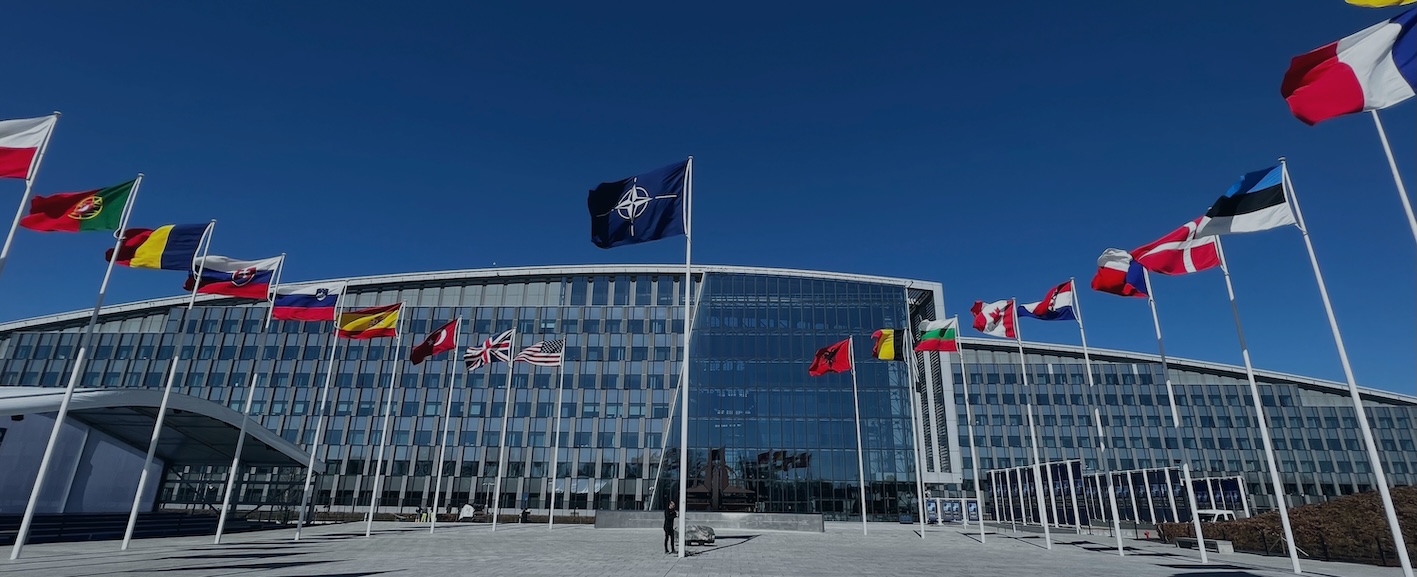Travel Risk Advisory
Evacuations from Israel and High-Risk Locations Call +44 (0)1202 308810 or Contact Us →
Travel Advice and Risk Mitigation Measures for the NATO Summit
Executive Summary
- The NATO Summit will take place in The Hague on 25–26 June 2025, attracting around 8,500 attendees, including heads of state, ministers, and international delegates.
- Heightened security and large-scale deployments will significantly affect daily life across the Randstad region from 22 to 27 June.
- Extensive airspace restrictions and runway closures at Schiphol Airport will disrupt commercial flights, with up to 30% reduction in capacity.
- Road closures on key routes around The Hague, Amsterdam, and Rotterdam will lead to severe congestion and travel delays.
- Demonstrations and counter-events are expected, with an increased risk of disruption near designated protest zones.
- There is an elevated cyber threat environment, with risks including disinformation, surveillance, and network intrusions.
- The Netherlands remains at a “substantial” terrorism threat level; lone actor attacks are more likely than coordinated group actions.
- Business and government travellers should adopt robust security measures and avoid affected areas unless operationally required. Learn more about Executive Protection and Secure Journey Management.

SITUATION SUMMARY
What to Expect for NATO Summit in The Hague
On 25 and 26 June 2025, the annual NATO Summit is set to take place in The Hague, Netherlands, for the first time since the founding of NATO in 1949. The event is set to host approximately 8,500 visitors, consisting of approximately 45 heads of state, 45 foreign ministers, 45 defence ministers, 6,000 delegates, 2,000 journalists, and 800 guests.
The summit is occurring within the context of the Trump administration consistently distancing itself from NATO, major developments in the war in Ukraine, and European NATO leaders increasingly discussing the necessity for capable European defence and deterrence against Russia that is independent from US support. While an official agenda has not been published, the summit will almost certainly address defence funding and membership status for its member states, in addition to boosting NATO defence capabilities.
The summit will almost certainly trigger significant travel disruptions and heightened security threats in the Randstad area from 22 to 27 June.
How will security be managed during the NATO Summit in The Hague?
Numerous security measures will be implemented during the summit. 27,000 police officers, approximately half of the Dutch National Police force, are set to be deployed across the two days, supported by 5,000 armed forces personnel and special forces teams on 24-hour standby.
Patriot air defence systems and counter-drone installations will reportedly be used to defend the summit from aerial threats. F-35 fighter jets and Apache patrols will also occur over the city and along the coast. An air exclusion zone will operate over a 22-kilometre stretch of coast between the Hook of Holland and Noordwyk.
Security will be prioritised at the World Forum (where the summit will be taking place), Huis ten Bosch (where the leaders will dine), and the Grand Hotel Huis ter Duin (where President Donald Trump will likely reside).
TRAVEL RISKS
Will flights and public transport be affected during the NATO Summit?
Significant travel disruptions should be expected during the week of the NATO Summit. The World Forum is approximately 30 minutes from two of the Netherlands’ largest airports, Amsterdam Schiphol Airport (AMS) and Rotterdam The Hague Airport (RTM).
Significant airport disruptions are almost certain, particularly at Schiphol, where the Polderbaan Runway will be closed to air traffic between 21 and 27 June. With the Buitenveldertbaan Runway currently under maintenance, commercial air traffic will be reduced by between 25 and 30 per cent during this period, with an estimated 100,000 passengers likely to face cancellations or rescheduling. This may increase traffic at The Hague airport as flights reroute.
Transport disruptions will also affect road travel. Authorities are set to close roads to transport world leaders on the A4, A5, A44, N44, and N440 from 22 to 27 June, which will almost certainly disrupt travel between Amsterdam, The Hague, and Rotterdam. The N434 will also be closed in the afternoon and evening of 25 June. Local and regional roads around the Hague, Wassenaar, Katwijk, Noordwijk, Haarlemmermeer, Leiden, and Rotterdam will also be closed, making several areas difficult to reach. Large-scale diversion routes have been set up.
The most congested periods will highly likely be late 23 June, early 24 June, and late 25 June. Triple the normal traffic volumes are to be expected at least 450 kilometres around the periphery of the World Forum. In anticipation of major traffic disruptions, the Dutch government have warned people to avoid the central Randstad region between 23 and 26 June, advising residents to work from home as much as possible and to use public transport if travel is necessary. Public transport will likely be overcrowded as people avoid driving disruptions and follow government advice, likely leading to an increase in petty crime.
Are protests expected during the NATO Summit in the Netherlands?
There will almost certainly be civil unrest in the days around the event. An international protest has already been organised for 22 June at Koekamp near the Hague Central Station by the Dutch Counter Summit Coalition for Peace and Justice. A “Counter Summit” conference has been scheduled for 21 to 22 June, which may draw additional protesters to The Hague.
Authorities have designated specific areas for demonstrations, with small-scale protests allowed around the World Forum, and larger-scale protests limited to the Malieveld. While the demonstrations will likely be peaceful, the high levels of security during the summit raise the possibility of clashes between protesters and security forces.
What cyber risks and espionage threats are linked to the NATO Summit?
There will likely be a heightened risk of cyberattacks and espionage, perpetrated mostly by Russia. Typical hybrid threats from Russia, in its campaign to gain a competitive advantage over its Western adversaries, include disinformation campaigns, sabotage, and cyberattacks.
Disinformation, particularly on social media platforms like X, will likely be used to sow confusion and undermine confidence in authorities; fake security, transportation, or health and safety alerts online are a potential method. Espionage could additionally target business travellers as hostile actors attempt to access confidential and proprietary information. Public Wi-Fi networks are a likely target, with perpetrators aiming to steal personal data or credentials.
Cyberattacks and sabotage targeting essential services such as transport infrastructure pose another threat, with perpetrators incentivised to cause disruptions to reduce the summit’s credibility.
Is there a terrorism threat during the NATO Summit 2025?
There is an increased threat of terrorism, resulting from the high visibility of the event. Before the event was announced, the Netherlands’ National Coordinator for Security and Counterterrorism (NCTV) placed the country at a threat level four, indicating a “substantial” risk of terrorist attack.
A recent attack took place on 27 March 2025, where a mass stabbing occurred near Dam Square, injuring five individuals. The perpetrator was a Ukrainian citizen from Donetsk; the motive is still unclear, but he has been charged with attempted murder with terrorist intent.
While the high levels of security likely lower the risk of coordinated attacks by violent extremist organisations (VEOs), lone actor attacks are more difficult to mitigate against and predict for intelligence agencies. Lone actors typically use unsophisticated opportunistic methods, including vehicle ramming, knife attacks, and arson.
MITIGATION
Travel Advice and Risk Mitigation Measures for the NATO Summit in The Hague
- Plan for significant travel disruptions. Check with your airline to confirm if your flight is still operating as scheduled.
- Adhere to instructions issued by authorities. Carry valid identification at all times.
- Unless specifically travelling to the event, avoid travelling near the World Forum, Huis ten Bosch, or Grand Hotel Huis ter Duin.
- Avoid the Diplomatic Zone around the Peace Palace, International Court of Justice, and embassies, which may be heavily restricted.
- Avoid areas where demonstrations are taking place.
- Avoid overt displays of wealth and be mindful of pickpockets, particularly in large crowds and on public transportation.
- Stay up to date with local news outlets. The Municipality of The Hague (Gemeente Den Haag) website typically publishes advisories regarding road closures and security perimeters.
- Business travellers in sensitive industries should assume that they are being targeted by espionage and implement the appropriate security protocols and countermeasures. These include avoiding public Wi-Fi networks; using multi-factor authentication, VPNs and loaner devices; and establishing clear red lines for what information they are willing to share and bring in-country. Learn more →

Request an Executive Protection Quote
Contact us to discuss secure transportation during Nato Summit 2025
Disruptions Expected as Direct Action Campaign Hits UK Insurance Sector
Intelligence cut off: 10:00 GMT 25 March 2025
On the morning of 25 March, starting at 10:00 UK time, a consortium of 12 pro-Palestine, environmentalist and left-wing groups are staging coordinated protests at the headquarters and offices of major insurance companies in London, Birmingham, Glasgow, and Manchester.
The protests, dubbed “Boycott Bloody Insurance” are aimed at opposing companies that the organisers deem to be “complicit in genocide” in Gaza and to be supporting the Israeli war efforts. The latest protests are part of a larger campaign that was launched on 10 March 2025, following the release of a report documenting the companies’ alleged ties to entities operating in Israel or providing munitions and arms to Israel.
The 10 March report has already had some impact in driving civil unrest and direct action targeting insurance companies. The Palestinian Youth Movement used the report to justify action against the global logistics company Maersk. Other groups that endorsed or supported the report include the Palestine Solidarity Campaign, the Palestinian Boycott Divestment Sanction (BDS) Committee, and the Watermelon Index.
Insurance companies have already been targeted by groups like Palestine Action. For instance, on 17 March, Palestine Action activists sprayed the front of the Allianz company offices in Manchester with red paint
INTELLIGENCE ANALYSIS
Security Concerns Rise as UK Protesters Target Insurance Sector Over Gaza Links
The 25 March protests are highly likely to be comprised of small-scale actions and are unlikely to significantly disrupt travel and services in the City of London and near the targets in Manchester, Birmingham, and Glasgow. Groups of activists will likely consist of a few dozen individuals at most. However, attendees are likely to be trained in direct action and may have some tools that could be used as weapons in a confrontation.
Based on previous protests, it is highly likely that the methods employed by the activists will be aimed at obtaining maximum media visibility through direct action. Consequently, it is highly likely that protesters will seek to spray paint on the entrances to the companies’ office buildings, smash windows, and may seek to physically disrupt entry to them by either forming human chains, “locking on” (attaching themselves to the buildings, their doors, or the ground immediately in front of them), or installing locks or chains to doors to prevent access.
Employees and bystanders entering the buildings or transiting in their vicinity are likely to face harassment and may be at a greater risk of violence, especially if they try to confront the protesters. There is also a realistic possibility of company and employees’ vehicles being vandalised, especially if they have clearly visible company logos.
Travel Risk Advice: Safety Guidelines for the United Kingdom
- Avoid all large gatherings.
- Closely monitor local news reports and government alerts.
- Monitor the local transport authority websites for reports of possible disruptions in London, Manchester, Birmingham, or Glasgow.
- Plan for alternative routes and means of transport.
- If caught in a protest area, try to leave quickly if it is safe to do so.
- Reconsider travel to company offices if possible.
- Ensure that you always carry personal identification documents or copies.
- Have emergency contact numbers saved on your phone. These should include the local authorities, medical facilities and any consular support. Ensure that mobile phones are charged in case of any loss in electricity.
- Consider relocating company vehicles away from areas likely to be targeted by protesters. Prioritise secure, indoor parking locations.
- Monitor the Solace Secure platform and trusted local media for updates relevant to the conflict.

Transport Hubs Closed as Protests and Restrictions Hit Istanbul
Intelligence cut off: 11:00 GMT 19 March 2025
On the morning of 19 March, the Mayor of Istanbul and head of the opposition Republican People’s Party (CHP), Ekrem Imamoglu, was arrested on suspicion of being the head of a “criminal organisation” as well as aiding the banned Kurdistan Workers’ Party (PKK).
On 18 March, Imamoglu was stripped of his university degree by Istanbul University, over reports of administrative irregularities during his studies. As university degrees are required for presidential candidates in Turkey, Imamoglu who is widely regarded as the most popular opposition candidate for the 2028 elections, has effectively been excluded from running by the university’s decision.
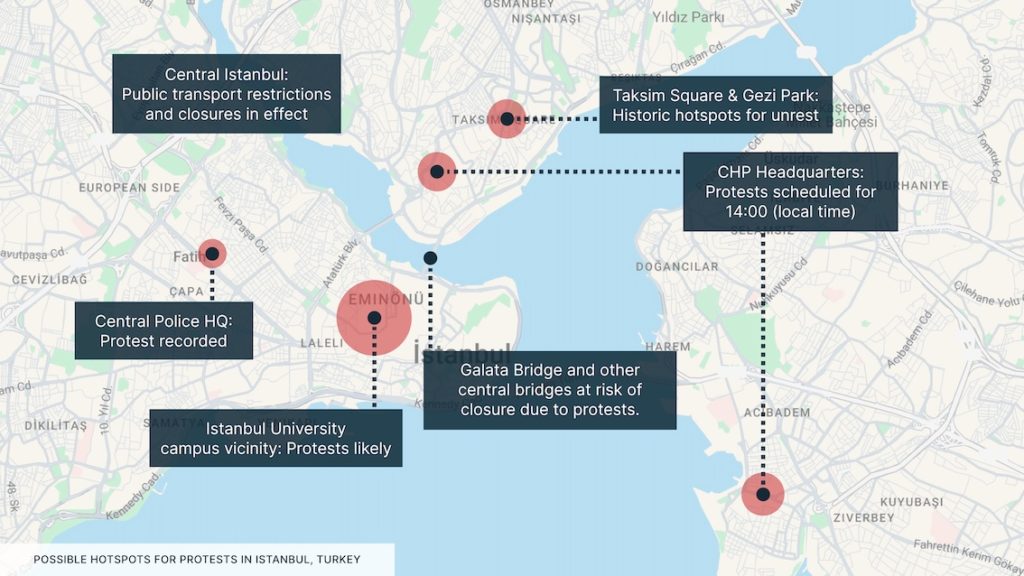
CHP is holding its candidate selection process on 23 March. In addition to Imamoglu, authorities reported that “100” other suspects had been arrested in the operation, including prominent journalist Ismail Saymaz.
Turkish media reported, following the arrest, that authorities have imposed a four-day restriction period on meetings, demonstrations, and press releases in the city. There are confirmed reports that Turkish authorities have imposed widespread internet restrictions, blocking access to platforms including X, YouTube, Instagram, and TikTok. In central Istanbul, multiple metro stations, including Taksim station, are reported to be closed on orders of the governor.
CHP leaders have organised multiple protests for 14:00 local time, including in Istanbul and Ankara. A gathering of protesters has been recorded at the central Istanbul police station as of the time of writing.
INTELLIGENCE ANALYSIS
Turkey Braces for Unrest as Opposition Vows Mass Protests
The arrest of Imamoglu is highly likely to provoke significant unrest, and it is almost certain to be perceived by opposition supporters as a move by the government of Recep Tayyip Erdogan to consolidate power and neutralise the opposition. Erdogan is constitutionally barred from running for president again, but it is likely that his Justice and Development Party (AKP) will field a constitutional amendment to prolong Erdogan’s presidency.
Protests are highly likely to concentrate in the centres of large cities, especially Istanbul. The CHP call for protests at the local party headquarters will almost certainly mean that these will be hotspots for gatherings of Imamoglu’s supporters. In addition to party offices, local universities are highly likely to be affected by unrest. Istanbul University is generally considered particularly liberal and is especially at risk as its students have in recent years launched several protests against its rectors, who are appointed directly by the president and are perceived to be excessively friendly to the government.
The authorities have closed Taksim Square metro station to limit the size of protests being organised near Taksim Square and are likely to close other stations.
Turkish police are highly likely to respond violently to any large gatherings and will also likely target isolated groups of protesters to prevent the formation of larger crowds. Turkish police employ harsh crowd-control measures including the use of tear gas, water cannons, and pepper spray. Arbitrary detentions of bystanders have been reported. Turkish authorities have previously used increased powers during periods of increased instability to detain foreign nationals who have engaged in or been near major protests.
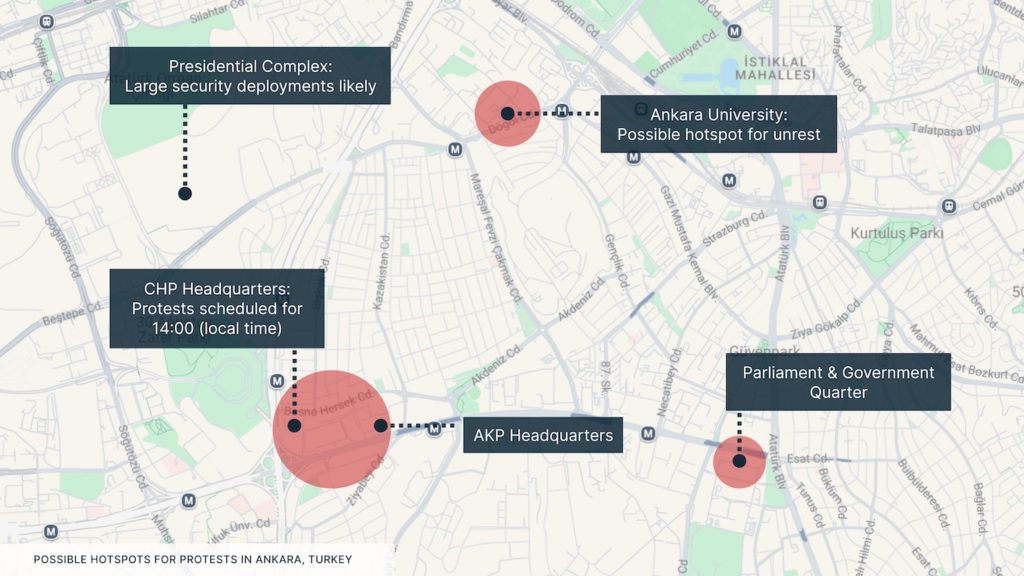
Travel Risk Advice: Safety Guidelines for Greece
- Avoid all large gatherings. Limit travel in central Istanbul and Ankara due to the threat of protests. Avoid travelling to the vicinity of university campuses.
- Closely monitor local news reports and government alerts.
- Monitor the IETT website for live updates on transport in Istanbul.
- Plan for alternative routes and means of transport in Istanbul and Ankara. Allocate additional time for all travel
- If caught in a protest area, try to leave quickly if it is safe to do so.
- If you are in a crowd and unable to leave, take precautions to minimise the risk of crowd crush. These include staying upright, moving away from all hard barriers, going with and not against the crowd, and holding your arms at chest level in a boxer-like stance to relieve pressure.
- Increased security deployments are likely to continue throughout the four-day restrictions period (19-22 March). Disruptions are highly likely to be particularly severe during the weekend.
- Ensure that you always carry personal identification documents or copies.
- Have emergency contact numbers saved on your phone. These should include the local authorities, medical facilities and any consular support. Ensure that mobile phones are charged in case of any losses in electricity.
- Consider options to bypass internet restrictions or mitigate their impacts. This could include downloading useful resources ahead of travel and using a VPN and Tor Browser while in-country.
- Monitor the Solace Secure platform and trusted local media for updates relevant to the conflict.
Subscribe to free weekly intelligence

Greece Shuts Down as Protests Mark Train Tragedy
Intelligence cut off: 11:00 GMT 28 February 2025
As of 28 February, large-scale protests and widespread service and transport disruptions are ongoing across Greece. The unrest falls on the second anniversary of the worst train crash in Greek history. On 28 February 2023, a freight train crashed head-on into a passenger train in the Tempe Valley area of Thessaly, killing 57 and injuring 85. Protests are scheduled to occur at more than 350 locations across Greece, as well as in more than 100 cities that have a large Greek diaspora.
In addition to a 24-hour general transport strike, multiple other strike actions are planned. Public services, healthcare facilities, schools, cultural institutions, restaurants, shops and other businesses will be shut down or run at limited capacity. Security measures have been heightened in Athens, including the deployment of over 6,000 police officers and the use of drones and helicopters to bolster surveillance.
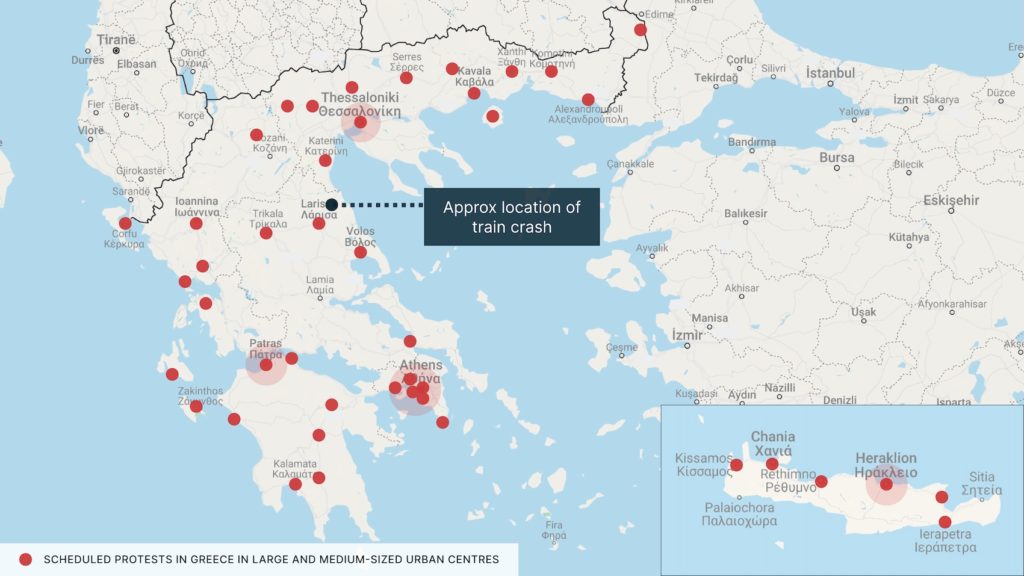
In the weeks and days before the protests, there have been significant updates concerning the crash. In January, leaked recordings from inside the passenger train showed that several passengers had survived the initial impact and had later died of asphyxia caused by chemical solvents illegally transported on the freight train. On 27 February, Greek authorities released a 180-page report that assessed that the crash had been caused by human error. According to the report, the passenger train was accidentally routed onto the same track as the incoming freight train.
INTELLIGENCE ANALYSIS
Government Under Fire as Greeks Demand Train Crash Justice
The crash has likely resulted in a severe and generalised loss of confidence in the government and other Greek political institutions, with many Greeks expressing the belief that the government has not done anything to achieve justice for the victims. Recent polling even indicates that over 80 per cent of Greeks feel that the Tempi train disaster was one of or the worst issues in Greece, with the vast majority also expressing that they were dissatisfied with the investigations into the incident and linking it to other issues, including socioeconomic grievances and corruption.
There is a high likelihood that today’s protests will result in significant levels of violence. Clashes between protesters and police were recorded in Thessaloniki on 27 February, and, as of the time of writing, there have been cases of improvised explosives being retrieved by authorities in the areas near the main rallying points. Violence at the protests is likely to take the form of vandalism, attacking local government and police buildings, as well as banks and other financial institutions. There is a remote possibility of protesters targeting diplomatic offices.
Greek police respond violently to severe unrest. Police are likely to deploy pepper spray, water cannons and tear gas, which may pose a threat to bystanders. While 28 February is likely to be the most severe day for unrest, it is likely that demonstrations will continue throughout the weekend, particularly in Athens and Thessaloniki.
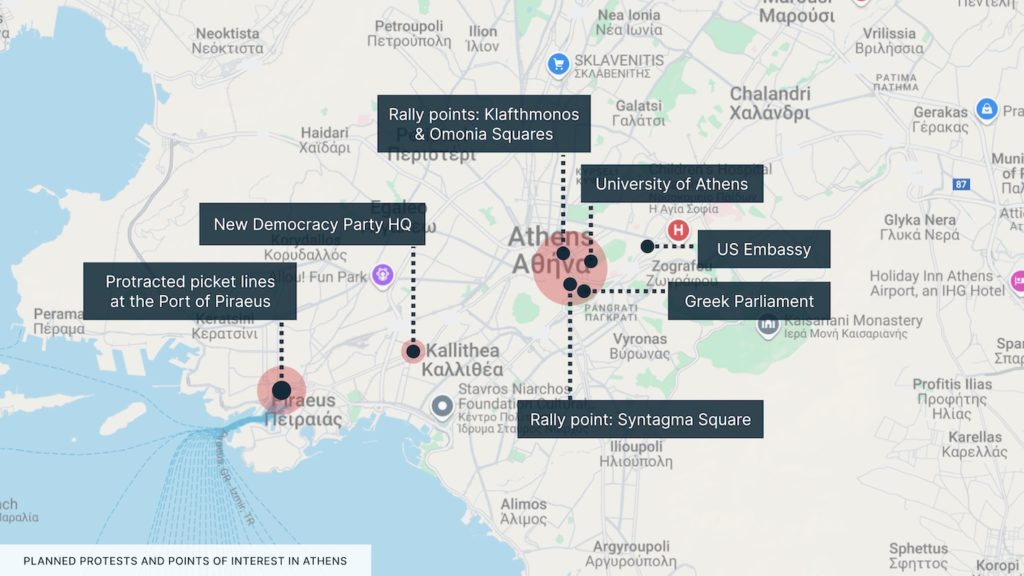
Travel Risk Advice: Safety Guidelines for Greece
- Avoid the area of Omonia, Parliament and Syntagma Square. Avoid the Piraeus area.
- Closely monitor local news reports and government alerts.
- Monitor the OASA website for live updates on transport in Athens.
- Plan for alternative routes and means of transport in Athens and other large cities. Allocate more time for all transport.
- If caught in a protest area, try to leave quickly if it is safe to do so.
- If you are in a crowd and unable to leave, take precautions to minimise the risk of crowd crush. These include staying upright, moving away from all hard barriers, going with and not against the crowd, and holding your arms at chest level in a boxer-like stance to relieve pressure.
- Increased security presence is almost certain to continue beyond 28 February. This will likely result in protracted transport disruptions.
- Ensure that you always carry personal identification documents or copies.
- Have emergency contact numbers saved on your phone. These should include the local authorities, medical facilities and any consular support. Ensure that mobile phones are charged in case of any losses in electricity.
- Monitor the Solace Secure platform and trusted local media for updates relevant to the conflict.
Subscribe to free weekly intelligence

Car-Ramming in Central Munich: What We Know So Far
Intelligence cut off: 14:00 GMT 13 February 2025
At approximately 10:30 (local time), a car ramming occurred in the centre of the Bavarian city of Munich, at the intersection of Dachauer Strasse and Seidlstrasse.
According to witnesses, an individual drove a vehicle into a crowd of members of the Verdi labour union, who had gathered for a rally in the Königsplatz area. Other witnesses reportedly stated they heard some gunshots, but these testimonies could not be corroborated by authorities at the time of writing.
At least 28 people were injured in the attack, with “several” in critical condition. No deaths have been reported as of the time of writing.
The police arrested the perpetrator on the scene. According to local German media, the suspect is a 24-year-old Afghan national, who was known to local police for previous non-terror-related offences. Available information suggests that the perpetrator of the attack acted alone.
While the police blocked traffic in the area immediately adjacent to the site of the ramming, no reports of widespread traffic closures or disruptions were identified as of the time of writing. The Munich Security Conference, which will be attended by numerous world leaders and high-profile figures, is scheduled to be held in the centre of the city between 14 and 16 February
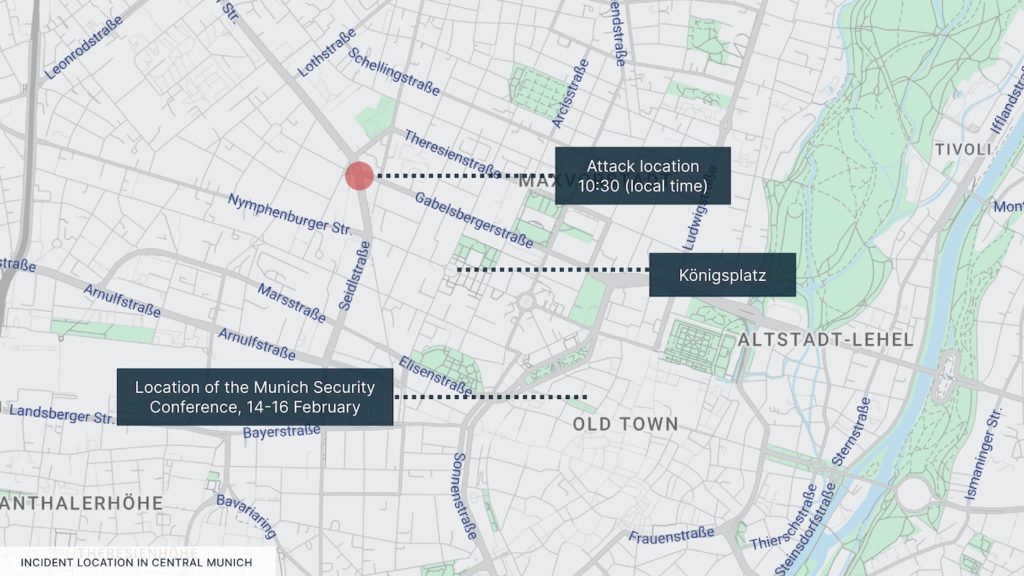
INTELLIGENCE ANALYSIS
Car-Ramming in Munich: Possible Terror Links and Election Impact
It is highly likely that the incident was terror-related. Its dynamics share considerable similarities with other cases of “lone wolf” terrorism recently recorded in Europe and North America.
The attack happened in a busy, high-visibility part of central Munich, and used an unsophisticated and easily accessible weapon.
Moreover, notable car-ramming attacks have occurred in Germany in the past, attaining extremely high visibility and likely inspiring copycats. These include a 2016 attack in Berlin, which killed 13 and injured 56, and the more recent attack in Magdeburg, on 20 December 2024, which killed 6 and resulted in hundreds of injuries.
The timing of the attack is likely linked to the upcoming German election, scheduled to occur in less than two weeks, and may have been meant to attain maximum visibility and possibly provoke further copycat actions.
The attack is almost certain to further increase the already high tensions surrounding the upcoming German elections, where the far-right Alternative for Germany (AfD) is highly likely to register its best-ever result.
Considering the impacts of past cases of terrorism in Germany, it is highly likely that the attack in Munich will spark large-scale protests (and counterprotests), particularly in Bavaria. These, in turn, are likely to be desirable targets both for possible copycats and, possibly, for “retaliatory” violence.
The election campaign and voting process in Germany are likely to face an elevated terrorism threat, particularly in large and medium-sized urban areas, during their final days.
Travel Risk Advice: Safety Guidelines for Munich, Germany
- In Munich, abide by authority directions, avoid all gatherings and the area of Königsplatz, and plan for alternative routes.
- Closely monitor local news reports and government alerts.
- If in the event you become caught in the vicinity of an attack you are reminded to RUN – HIDE – TELL.
- If caught in the vicinity of an attack, seek immediate hard cover and leave the area if safe to do so. Continue to adhere to all instructions issued by authorities and obey any security cordons in place.
- Further attacks cannot be ruled out. Remain vigilant over the coming days and avoid large gatherings, public buildings, transport hubs and military infrastructure where possible.
- Expect and plan for significant security deployments and disruptions in Munich and other German cities before and during the elections.
- Avoid all large gatherings as a precaution, as these may be targeted by copycat attackers.
- Ensure that you always carry personal identification documents or copies.
- Have emergency contact numbers saved on your phone. These should include the local authorities, medical facilities and any consular support. Ensure that mobile phones are charged in case of any losses in electricity.
- Monitor the Solace Secure platform and trusted local media for updates relevant to the conflict.
- The emergency number in Germany is 112.
Subscribe to free weekly intelligence

LGBTQ+ Travel Risks 2024

Duty of Care for LGBTQ+ Business Travellers in 2024
While many Western countries embrace LGBTQ+ inclusivity, several destinations still uphold conservative or heteronormative values, posing increased risks for LGBTQ+ travelers.
Our report sheds light on these challenges, advocating for comprehensive corporate travel policies that prioritise safety regardless of destination culture. It’s designed to assist LGBTQ+ individuals and corporate risk managers in understanding and mitigating these risks effectively.
Explore our comprehensive guide to navigating LGBTQ+ travel challenges and discover essential strategies for ensuring safe and inclusive business trips. For a deeper dive into this topic, additional resources are provided at the end of the report.
READ MORE
2024 Intelligence Forecast: LGBTQ+ Rights: Trends in 2024
In 2024, LGBTQ+ rights face a dynamic landscape shaped by shifting politics, religious perspectives, and socio-cultural norms. Navigating this environment demands a nuanced approach to advocacy and policy-making that embraces complexity and diversity.
Download Full Guide
Slovak Leader Fico Survives Assassination Attempt

Slovakia: PM Fico Shot in Suspected Assassination Attempt
Slovak Prime Minister Robert Fico is in a serious but stable condition following a suspected assassination attempt. The attack occurred on May 15 in the small town of Handlova, where Fico was meeting supporters outside a cultural centre. He was shot multiple times and immediately rushed to F. D. Roosevelt University Hospital in Banska Bystrica. After undergoing a five-hour surgery, he is currently in intensive care.
Populism and Political Violence
The alleged suspect, a 71-year-old writer and political activist, was detained at the scene. Authorities are investigating the motive behind the attack, which is widely believed to be politically motivated.
Fico’s Polarising Leadership and Geopolitical Stance
Fico, who secured office in October 2023 after a divisive campaign, has been a polarising figure. He is one of the few European leaders advocating for closer ties with Russia and has called for an end to the EU’s military support for Ukraine. Under his leadership, Slovakia has halted all arms deliveries to Kyiv.
Political Climate and Public Reaction: Populism, Media Independence, and Democracy at Stake
Fico’s government has made controversial moves, including a proposal to abolish the country’s public broadcaster and weaken anti-corruption laws. These actions have sparked fears about media independence and democracy in Slovakia, leading to widespread protests. Some believe these tensions contributed to the assassination attempt, with Fico’s ruling SMER party blaming false narratives from the opposition.
Future Implications: Increased Security and Potential Dissent Suppression
The attack on Prime Minister Fico is expected to lead to heightened security measures across Slovakia. In the long term, this incident might be used to justify suppressing dissent and pushing through more contentious government proposals. Additionally, Russian-affiliated social media accounts have been spreading information suggesting Ukrainian or NATO involvement, with some posts inciting violence against European officials.
Global Responses: Geopolitical Impact and Populist Trends
Former Russian President Dmitry Medvedev has hinted that the attack could be linked to Fico’s stance on Russia. While the risk of terrorism in Slovakia remains low, there is a realistic possibility of targeted violence and harassment against pro-EU Slovakian officials in the coming weeks.
READ MORE
2024 Intelligence Forecast: The Populist Wave and Polarisation in Europe in 2024
The rise of both far-right and far-left political parties in Europe in recent years has significantly complicated and energised the political landscape in the continent. This trend is expected to persist into 2024.
Subscribe to free weekly intelligence
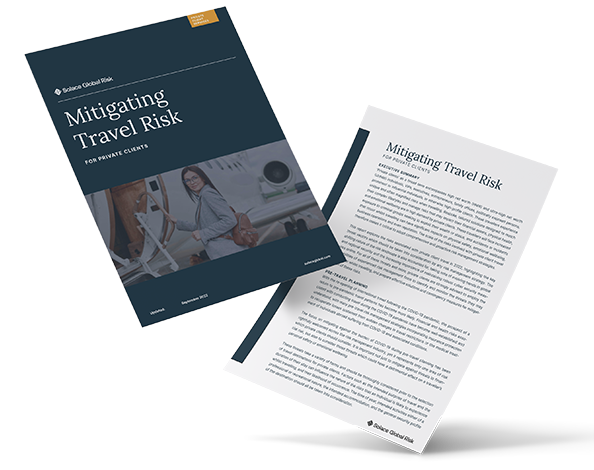
Solace Cyber Recognised as Assured Service Provider by National Cyber Security Centre.

Solace Cyber, a leading Cyber Security organisation with headquarters in Dorset, has achieved recognition as an Assured Service Provider under the prestigious Cyber Incident Response (Level 2) scheme by the National Cyber Security Centre (NCSC). This accolade positions Solace Cyber among the first in the UK to attain Incident Response accreditation through the scheme, highlighting their commitment to providing high-quality incident response services.
The NCSC’s Cyber Incident Response project aims to offer support to UK organisations that have fallen victim to cyber-attacks, by raising awareness of high-quality incident response providers who can offer external support and advice on how to manage and recover from cyber incidents.
The initiative builds on the Level 1 scheme, which was developed to assure companies that have the capability to provide incident response services to nationally significant organisations such as regulated industries, central government, and critical national infrastructure.

With an impressive track record, Solace Cyber has been instrumental in helping companies across the UK recover from ransomware attacks and data breaches. Serving as representatives for International Loss Adjusters and Cyber Insurance companies, Solace covers more than 30,000 commercial businesses nationwide, through our channels, providing hundreds of successful response recoveries.
Rowland Johnson, President of CREST said, “Congratulations to Solace for gaining NCSC Cyber Incident Response (Level 2) scheme Assured Service Provider status for its incident response services. This means Solace has been assessed as capable of supporting most organisations with common cyberattacks, such as ransomware. It provides valuable assurance to buyers of the high quality of Solace’s incident response services.”
This prestigious accreditation reaffirms Solace Cyber’s dedication to meeting the NCSC’s stringent standards for both technical and organisational capability. By achieving the Cyber Incident Response (Level 2) status, Solace Cyber continues to demonstrate its unwavering commitment to enhancing the cybersecurity landscape and providing unparalleled support to organisations facing the challenges of cyber threats.
For media inquiries, please contact: rbessant@solaceglobal.com
Incident Response Services
Complete a cyber risk assessment
We will test your security posture against the latest cyber threats.
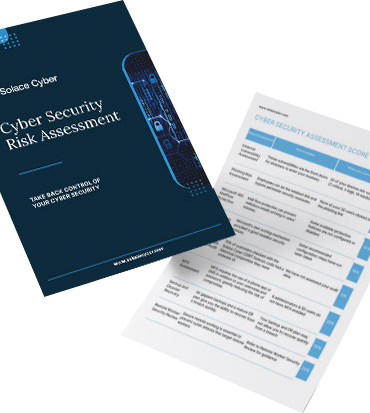
Request your incident response plan
You will receive a comprehensive report detailing the current IT cyber security posture of your estate as well as ongoing access to the Cyber Security Incident Response Team and the Realtime Risk Platform.

Access to Real-time Risk Platform
A comprehensive platform to consolidate all your cyber risk management.

Cloud XDR
Spot malicious activity and respond quickly, before material damage is done to your business.

Managed Detection & Response
Mitigate cyber risk for all endpoints and servers with these critical components; advanced machine learning and AI.

Alert Plus: Multiple Large Earthquakes Strike Southern Turkey

Situation Summary: Large Earthquakes in Southern Turkey
At 01:17 (UTC) on 6 February, a magnitude 7.8 earthquake was detected 30km west-northwest of Gaziantep, Turkey (37°10’26.4″N 37°01’55.2″E). The earthquake struck at a depth of 24.1km and it quickly became apparent that a significant amount of casualties and damage had occurred in Turkey and northern Syria. There have been several substantial aftershocks, eight of which recorded a magnitude of at least 5. Tremors have also been felt in Greece, Cyprus and Lebanon.
As of 10:00, at least 1200 fatalities had been confirmed across Turkey and Syria. Images and videos posted to social media and local news outlets indicate considerable damage to infrastructure. In Turkey alone, at least 2818 buildings have collapsed. At 10:24, the region was then struck again by a separate 7.5 magnitude earthquake 4km south-southeast of Ekinozu (37°10’26.4″N 37°01’55.2″E) – roughly 128km north of the earlier epicentre. At the time of writing, it has been reported that the region has experienced at least 100 aftershocks.
According to the United States Geological Survey (USGS), the area in which the quakes have hit is populated predominately by non-earthquake-resistant residential structures. They are often made of masonry, brick, and non-reinforced concrete frames. As a result, many buildings will have been badly damaged or will have collapsed completely. This means that there will be few places in which survivors can shelter safely.
Turkey declared a ‘Level 4 Alarm’ after the initial tremor, which reportedly includes a call for international assistance and support. The European Union has agreed to send rescue teams and is preparing further help for Turkey. US officials are also monitoring the situation and have noted their willingness to help. Rescue teams from India, Russia and Taiwan have also deployed.
President Recep Tayyip Erdogan has described events so far as the nation’s worst disaster since the 1939 Erzincan earthquake, a 7.8 magnitude earthquake that killed over 32,000.
Intelligence Analysis by Solace Global
The earthquakes have struck as Turkey prepares for its May elections, which were already seen as some of the country’s most consequential in decades. These earthquakes further add electoral weight, since previous large earthquakes have led to major political changes in the country. In the wake of Turkey’s last major earthquakes, in 1999, voters turned away the incumbent parties in the 2002 elections. These parties were punished as a result of the poor relief and reconstruction efforts, and for the large-scale corruption the earthquake exposed. Recep Tayyip Erdogan and his newly formed Justice and Development Party (AKP) party were the major beneficiaries of this political shift. As a result, he became Prime Minster in 2003 and ascended to the Presidency in 2014, a post he currently still holds.
The province of Gaziantep, where the epicentre of the earlier earthquake is located, has long been a cradle of support for the AKP and Erdogan. Indeed, support for the AKP and Erdogan has remained high in the province despite the recent economic volatility and uncertainty in the country, and the persistent accusations of corruption levied against the AKP and President Erdogan. Consequently, comprehensive aid and reconstruction efforts are likely to be implemented swiftly. Despite this, contemporary Turkish political history suggests that the AKP, having been the beneficiaries of the 1999 earthquake, may be victims of these ones. This becomes increasingly possible if victims feel that aid is too slow, not sufficient, or that reconstruction efforts are corrupt.
Northern Syria has also been badly affected by the disaster. This part of the country has seen several recent Turkish military incursions; it is also home to some of the last anti-government areas of control. The tremors are almost certain to mean that Turkish offensive military operations in the region are temporarily halted, as the military is redeployed to support disaster relief and search and rescue operations in Turkey. The Syrian government may also seek to fast-track search and rescue and reconstruction efforts in areas in the region it controls in a bid to try and win support across an area which was long a stronghold of anti-Assad movements.
Those with interests in the region are advised to note that there remains considerable potential for large-magnitude aftershocks or follow-on tremors.
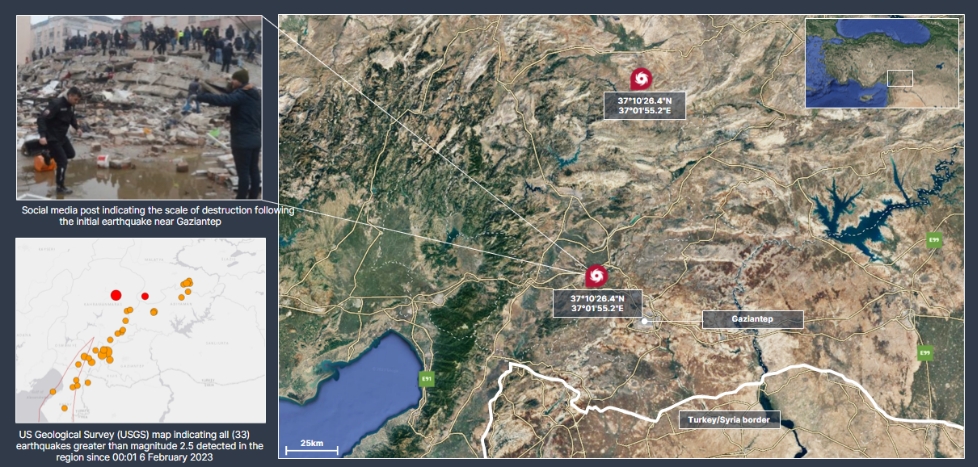
Advice if Affected by Earthquakes in Turkey
- Individuals with planned travel to Turkey or Syria are advised to reconfirm itineraries and expect considerable localised travel disruption, particularly in the vicinity of the Turkey/Syria international border
- Be aware that flights into and out of regional airports may be disrupted, impacting downstream travel plans
- Travellers are advised to avoid the immediate vicinity of all damaged infrastructure and ongoing emergency services operations
- Be aware that large aftershocks or additional earthquakes have a realistic possibility of occurring in the coming hours
- If caught in an earthquake, it is advisable to ‘Drop, Cover, and Hold On’ to reduce the risk of injuries, ensuring to cover the head and neck
- Following an earthquake, there can be serious hazards, such as damaged buildings, leaking gas and water pipes, and downed power lines
- If caught outside during earthquakes, exit vehicles and remain clear of overhead powerlines, bridges, or large structures
- If earthquakes occur during travel within coastal regions, be alert to the possibility of tsunami and consider heading towards high-ground once the initial tremors have passed
- Anticipate disruption to essential services, including water and electricity, WiFi or GSM/cellular network coverage, in addition to considerable pressure on local healthcare services
- Adhere to all instructions issued by emergency services or local government/security officials
- Monitor the Solace Secure platform and trusted local media for updates
Risk Management for NGO’s in Turkey and Syria
Alert Plus: Istanbul Explosion
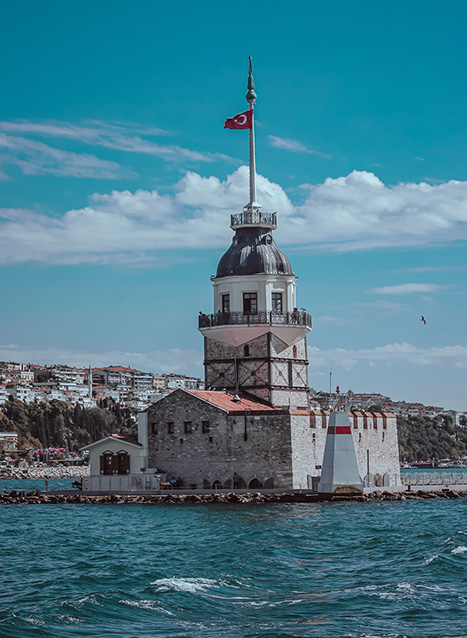
Situation Summary
On 13 November, at around 16:20 local time, an explosion occurred on Istiklal Caddesi in Istanbul. The street is mostly pedestrianised and is frequented by large numbers of both residents and tourists.
Available footage from the attack indicates that an explosive device was placed in a bag and then left on a bench in proximity to a Mango clothing store. Authorities believe the bag was left by a female suspect, who sat on the bench for around 40 minutes before walking away immediately prior to the explosion. Local authorities have also suggested that a nail bomb was used in the attack, which was designed to inflict mass-casualties.
As of 14 November, six deaths have been confirmed with a further 81 injured in the attack. Of those injured, 50 have been discharged from hospital, whilst the remainder are still being treated. Although Istiklal Caddesi has now reopened, having been closed in the immediate aftermath of the attack, there is an extensive police and security force presence in the area.
Turkish authorities announced on 14 November that a Syrian female suspect and a further 46 other individuals had been arrested following security raids at 21 different locations. Authorities have announced their belief that the perpetrator was a Syrian national, Ahlam Albahsir, who was trained as an intelligence officer by the Kurdistan Workers Party (PKK) and the People Defence Units (YPG). Despite this announcement, the PKK’s military umbrella organization, the People’s Defense Center (HSM) has denied being involved in this attack. Syria’s Kurdish-led and US- backed Syrian Democratic Forces (SDF) have also denied involvement.
Whilst no group has claimed responsibility for the attack, Turkish Interior Minister Suleyman Soylu claims that the attack was planned in Ayn al-Arab, a Kurdish- majority city in northern Syria. Soylu also stated that the attack was planned by the PKK/YPG, without offering evidence to support his claims. Despite the suspect’s alleged links to the PKK, Turkish officials have not ruled out an attack by the Islamic State (IS).
Solace Global Comment
The PKK is classed as a terror group by Turkey, the United States, the European Union, and since 1984 has been engaged in conflict with the Turkish State. Between 2015 and 2017, Turkey witnessed a string of attacks perpetrated by various Kurdish militia groups and IS. The attack on 13 November was the most recent terrorist incident in Istanbul since the January 2017 attack at the Reina nightclub in Ortakoy, which killed 39 people and was claimed by IS.
Istiklal street has also been attacked previously, with a suicide bombing in March 2016 killing five and wounding a further 36. In that instance, authorities initially blamed the PKK for the attack although subsequently confirmed that IS had been responsible.
The accusation by the Turkish authorities that the attack was planned by the PKK/YPG in northern Syria will very likely provide the justification for Turkey to launch a new cross-border operation into northern Syria. Since 2016, Turkish armed forces have been involved in northern Syria, targeting PKK/YPG forces. In May 2022 it was announced that Turkey’s planned fifth offensive in the region had been postponed, with some sources indicating this was due to pressure from other NATO allies. It therefore remains likely that Turkish authorities will seek to leverage anti-Kurdish sentiment in order to conduct limited offensive operations across the Syrian border in the short term.
In June 2023 Turkey will also hold general elections, which will include the election of the President of Turkey and elections to the country’s Grand National Assembly. Previous terror attacks between 2015 and 2017 are widely credited to have brought security issues to the forefront for the elections of 2018. It is highly likely that this attack will result in an increased focus on security in domestic political narratives in the short to medium term.
In the immediate short term, Istanbul and other major Turkish cities are likely to see an increase in the visible presence of police and security officials. Taksim square and Gezi park are the primary locations in Istanbul for civil unrest, protests and demonstrations, with an elevated security force posture in these areas very likely to remain advantageous to the Turkish authorities in the build up to the general elections next year.

Solace Global Advice
- In the event of a terrorist attack those in the area are reminded to RUN – HIDE – TELL – FIGHT
- Turkey has a notable risk of terrorism. Further attacks remain realistically possible, although the presence of additional security force personnel will likely mitigate the risk in the immediate term
- Individuals with planned travel to Istanbul are advised to reconfirm itineraries and expect localised travel disruption, particularly in the immediate vicinity of the incident
- Travellers are advised to avoid Istiklal Caddesi as emergency services remain on the scene to conduct their investigations
- Further terror attacks in Istanbul are likely to be indiscriminate, targeting crowded areas, government or security force installations and personnel, civilians, transportation networks such as metro stations and ferry terminals, and other high-profile locations including sporting infrastructure
- Locations where large groups of residents or tourists are known to gather are at higher risk of attack. You should be particularly vigilant in these areas and follow any specific advice or guidance from the local authorities or security personnel
- Exercise increased caution, remain vigilant, be aware of your surroundings and report any suspicious activity or items to security personnel as soon as possible
- If caught in the vicinity of a security incident, seek immediate hard cover from any incoming gunfire or explosions and leave the area if safe to do so. Continue to adhere to all instructions issued by authorities and obey any security cordons in place
- Monitor the Solace Secure platform and trusted local media for updates
